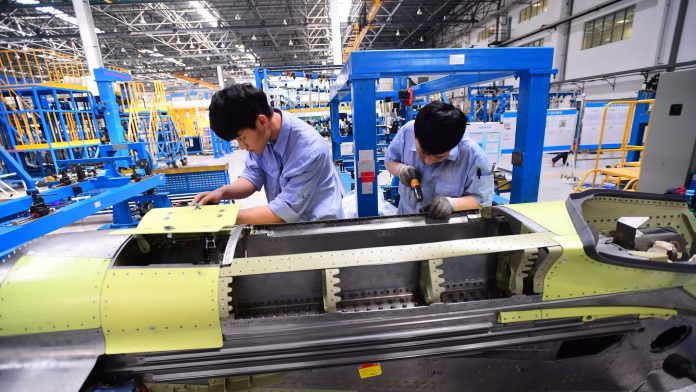Many universities in China are carrying out special recruitment campaigns for their graduates in the spring season.
According to the job positions provided by employers, the number of opportunities in emerging sectors, such as new energy vehicles (NEVs), smart manufacturing, artificial intelligence and big data, has been increasing.
A job fair held at Shanghai Maritime University recently attracted nearly 500 companies and offered about 110,000 jobs. About one-third of those openings came from emerging industries.
Zhang Feng, deputy head of the job introduction section of Shanghai Pudong New Area Employment Promotion Center, told China Media Group (CMG) that the number of emerging industry enterprises participated in these recruitment campaigns and the number and types of jobs that they provide are all increasing year by year.
Data from job-seeking service provider Liepin showed that job postings requiring expertise in artificial intelligence-generated content (AIGC) increased 179% during the first 10 months of 2023, compared with the same period in the previous year.
Tang Tianyi is a fresh master’s degree graduate of Gaoling School of Artificial Intelligence, Renmin University of China. So far, he has got about 10 offers.
“Now the job market is in urgent need of AI talent. My research direction is natural language processing, which studies, for example, the better application of AI models in the Chinese context,” Tang told CMG.
China’s progress in technological innovation and industrial upgrading is driving a boom in job opportunities in emerging sectors, highlighting the country’s growing demand for skilled hi-tech professionals.
Professor Zhao Zhong, dean of the School of Labor and Human Resources, Renmin University of China, told CMG that new quality productive forces are essentially technological revolutions driven by innovations in technology.
“The demand for college graduates majoring in big data, AI, and information technology will increase,” said Zhao, adding that humanities and social science professionals are also needed in building a social policy system and social security system suitable for the development of new quality productive forces, such as ethics in the AI development.
The Xi’an University of Science and Technology first launched the major of smart manufacturing engineering in 2020.
Graduates of this major have been recognised by enterprises in this year’s spring recruitment.
Yang Manzhi, director of the major, told CMG that it is a new interdisciplinary discipline of machinery, computer and automation, and more new courses have been added to their syllabus, such as AI, industrial Internet and big data.
The university’s majors have been updated year by year based on the industrial development trends, demand in the market, and the employment rate. Currently, a major is classified as obsolete if the employment rate of its graduates is below 50% for three consecutive years.
In the past five years, the university has cancelled five majors and opened eight new majors.
Professor Zhao said multi-party cooperation between schools, enterprises and the government can optimize the design of curriculum and talent training, better meeting the demand of the labour market.
China is expected to see nearly 11.8 million college graduates in 2024, and the number of young job-seekers has continued to grow, according to the Ministry of Human Resources and Social Security (MHRSS).
In 2024, China will maintain employment as its top priority by increasing fiscal subsidies and tax incentives, providing greater financial assistance, and reducing the social insurance burden, said Yun Donglai, an MHRSS official, at a press conference in January.
To meet the surging market demand for skilled professionals, China provided government-subsidised vocational training to 18 million people in 2023, with a special focus on key sectors such as advanced manufacturing and modern services, according to the MHRSS.
The country has set aside 66.7 billion yuan (about US$9.39 billion) for employment subsidies this year, with a particular focus on the employment and entrepreneurship of college graduates, rural migrant workers and other key populations.
Yun said China will also encourage advanced manufacturing, along with the digital, eco-friendly and elderly care sectors, to play a greater role in creating jobs, while intensifying support for major employment drivers such as private, small- and medium-sized companies. – CGTN





















